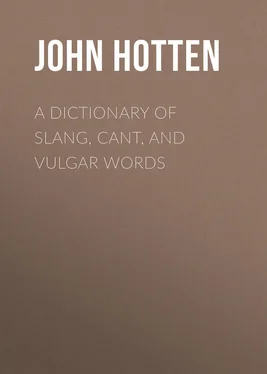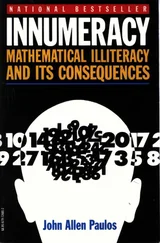John Hotten - A Dictionary of Slang, Cant, and Vulgar Words
Здесь есть возможность читать онлайн «John Hotten - A Dictionary of Slang, Cant, and Vulgar Words» — ознакомительный отрывок электронной книги совершенно бесплатно, а после прочтения отрывка купить полную версию. В некоторых случаях можно слушать аудио, скачать через торрент в формате fb2 и присутствует краткое содержание. ISBN: , Жанр: foreign_antique, foreign_prose, на английском языке. Описание произведения, (предисловие) а так же отзывы посетителей доступны на портале библиотеки ЛибКат.
- Название:A Dictionary of Slang, Cant, and Vulgar Words
- Автор:
- Жанр:
- Год:неизвестен
- ISBN:http://www.gutenberg.org/ebooks/47018
- Рейтинг книги:3 / 5. Голосов: 1
-
Избранное:Добавить в избранное
- Отзывы:
-
Ваша оценка:
- 60
- 1
- 2
- 3
- 4
- 5
A Dictionary of Slang, Cant, and Vulgar Words: краткое содержание, описание и аннотация
Предлагаем к чтению аннотацию, описание, краткое содержание или предисловие (зависит от того, что написал сам автор книги «A Dictionary of Slang, Cant, and Vulgar Words»). Если вы не нашли необходимую информацию о книге — напишите в комментариях, мы постараемся отыскать её.
A Dictionary of Slang, Cant, and Vulgar Words — читать онлайн ознакомительный отрывок
Ниже представлен текст книги, разбитый по страницам. Система сохранения места последней прочитанной страницы, позволяет с удобством читать онлайн бесплатно книгу «A Dictionary of Slang, Cant, and Vulgar Words», без необходимости каждый раз заново искать на чём Вы остановились. Поставьте закладку, и сможете в любой момент перейти на страницу, на которой закончили чтение.
Интервал:
Закладка:
The Universities of Oxford and Cambridge , and the great public schools, are the hotbeds of fashionable Slang. Growing boys and high-spirited young fellows detest restraint of all kinds, and prefer making a dash at life in a Slang phraseology of their own, to all the set forms and syntactical rules of Alma Mater . Many of the most expressive words in a common chit-chat, or free-and-easy conversation, are old University vulgarisms. Cut, in the sense of dropping an acquaintance, was originally a Cambridge form of speech; and HOAX, to deceive or ridicule, we are informed by Grose, was many years since an Oxford term. Among the words that fast society has borrowed from our great scholastic [I was going to say establishments , but I remembered the linen drapers’ horrid and habitual use of the word] institutions, I find CRIB, a house or apartments; DEAD-MEN, empty wine bottles; DRAWING TEETH, 48wrenching off knockers; FIZZING, first-rate, or splendid; GOVERNOR, or RELIEVING OFFICER, the general term for a male parent; PLUCKED, defeated or turned back; QUIZ, to scrutinise, or a prying old fellow; and ROW, a noisy disturbance. The Slang words in use at Oxford and Cambridge would alone fill a volume. As examples I may instance SCOUT, which at Oxford refers to an undergraduate’s valet, whilst the same menial at Cambridge is termed a GYP, – popularly derived by the Cantabs from the Greek, GYPS (γυψ), a vulture; SCULL, the head, or master of a college; BATTLES, the Oxford term for rations, changed at Cambridge into COMMONS. The term DICKEY, a half shirt, I am told, originated with the students of Trinity College, Dublin, who at first styled it a TOMMY, from the Greek, τομη, a section. Crib, a literal translation, is now universal; GRIND refers to a walk, or “constitutional;” HIVITE is a student of St. Begh’s (St. Bee’s) College, Cumberland; to JAPAN, in this Slang speech, is to ordain; MORTAR-BOARD is a square college cap; SIM a student of a Methodistical turn, – in allusion to the Rev. Charles Simeon; SLOGGERS, at Cambridge, refers to the second division of race boats, known at Oxford as TORPIDS; SPORT is to show or exhibit; TROTTER is the jocose term for a tailor’s man who goes round for orders; and TUFTS are wealthy students who dine with the DONS, and are distinguished by golden tufts , or tassels, in their caps. There are many terms in use at Oxford not known at Cambridge; and such Slang names as COACH, GULF, HARRY-SOPH, POKER, or POST-MORTEM, common enough at Cambridge, are seldom or never heard at the great sister University. For numerous other examples of college Slang, the reader is referred to the Dictionary.
Religious Slang , strange as the compound may appear, exists with other descriptions of vulgar speech at the present day. Punch , a short time since, in one of those half-humorous, half-serious articles in which he is so fond of lecturing any national abuse or popular folly, remarked that Slang had “long since penetrated into the Forum, and now we meet it in the Senate, and even the Pulpit itself is no longer free from its intrusion .” I would not, for one moment, wish to infer that the practice is general. On the contrary, and in justice to the clergy, it must be said that the principal disseminators of pure English throughout the country are the ministers of our Established Church. Yet it cannot be denied but that a great deal of Slang phraseology and disagreeable vulgarism have gradually crept into the very pulpits which should give forth as pure speech as doctrine.
Dean Conybeare, in his able Essay on Church Parties , 49has noticed this wretched addition to our pulpit speech. As stated in his Essay, the practice appears to confine itself mainly to the exaggerated forms of the High and Low Church – the Tractarians and the “Recordites.” 50By way of illustration, the Dean cites the evening parties, or social meetings, common amongst the wealthier lay members of the Recordite (exaggerated Evangelical) Churches, where the principal topics discussed – one or more favourite clergymen being present in a quasi-official manner – are “the merits and demerits of different preachers, the approaching restoration of the Jews, the date of the Millennium, the progress of the ‘Tractarian heresy,’ and the anticipated ‘perversion’ of High Church neighbours.” These subjects are canvassed in a dialect differing considerably from common English. The words FAITHFUL, TAINTED, ACCEPTABLE, DECIDED, LEGAL, and many others, are used in a technical sense. We hear that Mr. A. has been more OWNED than Mr. B; and that Mr. C. has more SEALS 51than Mr. D. Again, the word GRACIOUS is invested with a meaning as extensive as that attached by young ladies to nice . Thus, we hear of a “GRACIOUS sermon,” a “GRACIOUS meeting,” a “GRACIOUS child,” and even a “GRACIOUS whipping.” The word DARK has also a new and peculiar usage. It is applied to every person, book, or place, not impregnated with Recordite principles. We once were witnesses of a ludicrous misunderstanding resulting from this phraseology. “What did you mean (said A. to B.) by telling me that – was such a very DARK village? I rode over there to day, and found the street particularly broad and cheerful, and there is not a tree in the place.” “ The Gospel is not preached there ,” was B.’s laconic reply. The conclusion of one of these singular evening parties is generally marked by an “ exposition ” – an unseasonable sermon of nearly one hour’s duration, circumscribed by no text, and delivered from the table by one of the clerical visitors with a view to “improve the occasion.” In the same Essay, the religious Slang terms for the two great divisions of the Established Church, receive some explanation. The old-fashioned High Church party, rich and “stagnant,” noted for its “sluggish mediocrity, hatred of zeal, dread of innovation, abuse of dissent, blundering and languid utterance,” is called the HIGH AND DRY; whilst the corresponding division, known as the Low Church, equally stagnant with the former, but poorer, and more lazily inclined (from absence of education), to dissent, receives the nickname of the LOW AND SLOW. Already have these terms become so familiar that they are shortened, in ordinary conversation, to the DRY and the SLOW. The so-called “Broad Church,” I should remark, is often spoken of as the BROAD AND SHALLOW.
What can be more objectionable than the irreverent and offensive manner in which many of the dissenting ministers continually pronounce the names of the Deity, God and Lord. God, instead of pronouncing in the plain and beautifully simple old English way, G-O-D, they drawl out into GORDE or GAUDE; and Lord, instead of speaking in the proper way, they desecrate into LOARD or LOERD, – lingering on the u , or the r , as the case may be, until an honest hearer feels disgusted, and almost inclined to run the gauntlet of beadles and deacons, and pull the vulgar preacher from his pulpit. I have observed that many young preachers strive hard to acquire this peculiar pronunciation, in imitation of the older ministers. What can more properly, then, be called Slang, or, indeed, the most objectionable of Slang, than this studious endeavour to pronounce the most sacred names in a uniformly vulgar and unbecoming manner. If the old-fashioned preacher whistled Cant through his nose, the modern vulgar reverend whines Slang from the more natural organ. These vagaries of speech will, perhaps, by an apologist, he termed “pulpit peculiarities,” and the writer dared to intermeddle with a subject that is or should be removed from his criticisms. The terms used by the mob towards the Church, however illiberal and satirically vulgar, are within his province in such an inquiry as the present. A clergyman, in vulgar language, is spoken of as a CHOKER, a CUSHION THUMPER, a DOMINE, an EARWIG, a GOSPEL GRINDER, a GRAY COAT PARSON – if he is a lessee of the great tithes, ONE IN TEN, PADRE – if spoken of by an Anglo-Indian, a ROOK, a SPOUTER, a WHITE CHOKER, or a WARMING PAN RECTOR, if he only holds the living pro tempore , or is simply keeping the place warm for his successor. If a Tractarian, his outer garment is rudely spoken of as a PYGOSTOLE, or M.B. (MARK OF THE BEAST) COAT. His profession is termed THE CLOTH, and his practice TUB THUMPING. Should he belong to the dissenting body, he is probably styled a PANTILER, or a PSALM SMITER, or, perhaps, a SWADDLER. His chapel, too, is spoken of as a SCHISM SHOP. A Roman Catholic, I may remark, is coarsely named a BRISKET BEATER.
Читать дальшеИнтервал:
Закладка:
Похожие книги на «A Dictionary of Slang, Cant, and Vulgar Words»
Представляем Вашему вниманию похожие книги на «A Dictionary of Slang, Cant, and Vulgar Words» списком для выбора. Мы отобрали схожую по названию и смыслу литературу в надежде предоставить читателям больше вариантов отыскать новые, интересные, ещё непрочитанные произведения.
Обсуждение, отзывы о книге «A Dictionary of Slang, Cant, and Vulgar Words» и просто собственные мнения читателей. Оставьте ваши комментарии, напишите, что Вы думаете о произведении, его смысле или главных героях. Укажите что конкретно понравилось, а что нет, и почему Вы так считаете.












